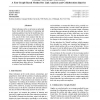Free Online Productivity Tools
i2Speak
i2Symbol
i2OCR
iTex2Img
iWeb2Print
iWeb2Shot
i2Type
iPdf2Split
iPdf2Merge
i2Bopomofo
i2Arabic
i2Style
i2Image
i2PDF
iLatex2Rtf
Sci2ools
107
click to vote
ICML
2003
IEEE
2003
IEEE
Finding Underlying Connections: A Fast Graph-Based Method for Link Analysis and Collaboration Queries
Many techniques in the social sciences and graph theory deal with the problem of examining and analyzing patterns found in the underlying structure and associations of a group of entities. However, much of this work assumes that this underlying structure is known or can easily be inferred from data, which may often be an unrealistic assumption for many real-world problems. Below we consider the problem of learning and querying a graph-based model of this underlying structure. The model is learned from noisy observations linking sets of entities. We explicitly allow different types of links (representing different types of relations) and temporal information indicating when a link was observed. We quantitatively compare this representation and learning method against other algorithms on the task of predicting future links and new "friendships" in a variety of real world data sets.
| Added | 17 Nov 2009 |
| Updated | 17 Nov 2009 |
| Type | Conference |
| Year | 2003 |
| Where | ICML |
| Authors | Jeremy Kubica, Andrew W. Moore, David Cohn, Jeff G. Schneider |
Comments (0)

